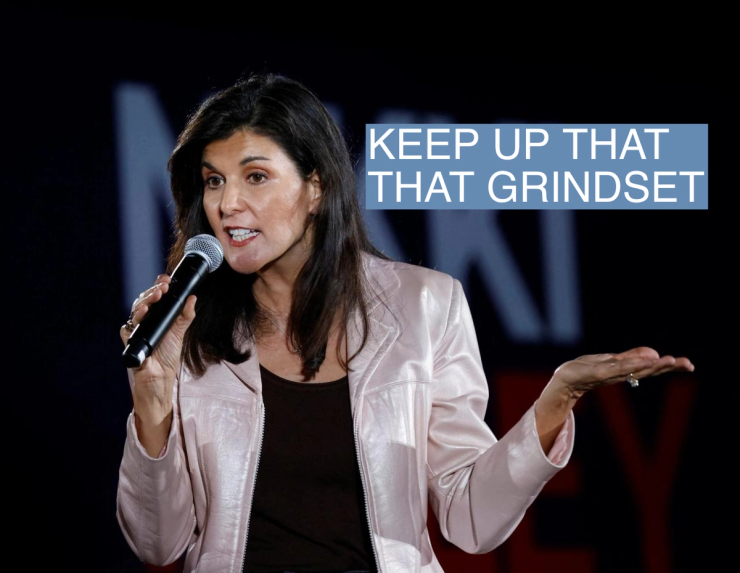The News
Everybody knows that hiking the retirement age for all Americans would be wildly unpopular.
But what if you only raised it for workers in their twenties and thirties? Or even just Gen Z?
A handful of Republicans have toyed with that idea recently, as they’ve searched for ways to fix Social Security’s long-term finances without increasing taxes or cutting benefits for older voters. Presidential contender Nikki Haley says Washington should lift the eligibility age for new workers in their 20s. Former Vice President Mike Pence, who’s gearing up for his own run, says he’d raise it for those who are currently more than 25 years away from retirement. He’s also floated providing younger Americans with private savings accounts.
Some members of Congress who are looking to overhaul Social Security also argue younger people should work longer before receiving full benefits.
“Somebody who’s got 30 years to go before a base retirement, that’s probably a pretty reasonable time to state: It might take you an extra six months to a year before you’re at full retirement benefits,” GOP Sen. Mike Rounds of South Dakota, who has been involved in the chamber’s bipartisan Social Security discussions, told Semafor.
But new polling from Data for Progress, provided first to Semafor, suggests Americans are cold on the concept. It finds that about 65% of likely voters are against lifting the retirement age for people in their 20s, compared to 27% who support it. Among self-identified GOP voters, the split is similar: 59% are opposed and only 32% are in favor.
The Data for Progress poll also looked specifically at three swing districts in New York, where GOP gains in 2022 helped the party take back control of the House. In one of the districts, just 20% supported raising the retirement age to 70 for future generations. In the other two, less than 10% supported it.
In this article:
Joseph’s view
It’s not difficult to see why younger Americans are front and center in the Social Security debate. They consistently vote at lower rates than seniors so they’re less capable of exacting revenge at the polls. Many simply don’t believe Social Security will be there to cushion their retirement in the same way it did for their grandparents.
But in recent years there’s also been a striking shift among Americans against shrinking spending on popular programs like Social Security. As this latest polling suggests, that’s made it a challenge for Republicans to translate their desire to tighten the government’s belt into measures that gain favor with voters, even their own.
A recent Fox News poll captures the magnitude of the change: In March, only 26% of Americans said that reducing the deficit was more important than maintaining Social Security and Medicare spending, down 14 percentage points from a decade earlier.
The last time Congress raised the retirement age, lawmakers added it last-minute as an amendment to the 1983 Social Security deal. It’s nearly impossible to imagine Congress quietly slipping such a major policy change past voters in this era.
“Before the current increase in the full retirement age started to go into effect, people didn’t necessarily understand that it was in fact a benefit reduction,” Laura Haltzel, a retirement security expert at the liberal-leaning Century Foundation, told Semafor. “I think that awareness has had an effect so that something like that just doesn’t play out the way that it did back in 1983 when it was a new concept.”
You can trace the growing reluctance to touch voters’ retirement benefits through Republican platforms. In 2012, GOP presidential candidate Mitt Romney promised to spare Americans 55 and older from any changes to Social Security. Now, Pence is pledging to protect the status quo for Americans still in their 40s. And of course, Donald Trump has urged Congress not to cut a “single penny” from the program.
Room for Disagreement
Some Republicans still believe that lifting the eligibility age must be at least considered in any grand bargain on Social Security, which on its current trajectory won’t be able to pay out full benefits after 2034, when its main trust fund runs dry.
“When we’re trying to figure out how we’re going to make our Social Security system more sustainable going forward, we’ve got to put some things out on the table that can actually help in that direction and raising the age is one of those things,” Sen. Lisa Murkowki, R-Alaska, told Semafor.
Notable
- Life expectancy in the US has lagged behind other similarly wealthy nations. But a recent piece from John Burn-Murdoch at the Financial Times illustrated that it’s sharply worsened due to a spike in deaths among young people from overdoses, gun violence, and other violent causes. “The average American has the same chance of a long and healthy life as someone born in the most deprived town in England,” Burn-Murdoch writes. David Wallace-Wells also delved into the troubling mortality data in The New York Times.


